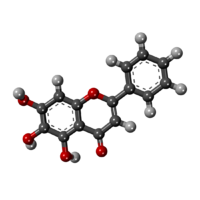Baicalein
 |
|
 |
|
| Names | |
|---|---|
|
IUPAC name
5,6,7-Trihydroxy-2-phenyl-chromen-4-one
|
|
| Other names
5,6,7-Trihydroxyflavone
|
|
| Identifiers | |
|
3D model (Jmol)
|
|
| ChEBI | |
| ChemSpider | |
| ECHA InfoCard | 100.164.911 |
|
PubChem CID
|
|
| UNII | |
|
|
|
|
| Properties | |
| C15H10O5 | |
| Molar mass | 270.24 g·mol−1 |
|
Except where otherwise noted, data are given for materials in their standard state (at 25 °C [77 °F], 100 kPa).
|
|
|
|
|
| Infobox references | |
Baicalein (5,6,7-trihydroxyflavone) is a flavone, a type of flavonoid, originally isolated from the roots of Scutellaria baicalensis and Scutellaria lateriflora. It is also reported in Oroxylum indicum or Indian trumpetflower. It is the aglycone of baicalin. Baicalein is one of the active ingredients of Sho-Saiko-To, a Japanese herbal supplement believed to enhance liver health.
Baicalein, along with its analogue baicalin, is a positive allosteric modulator of the benzodiazepine site and/or a non-benzodiazepine site of the GABAA receptor. It displays subtype selectivity for α2 and α3 subunit-containing GABAA receptors. In accordance, baicalein shows anxiolytic effects in mice without incidence of sedation or myorelaxation. It is thought that baicalein, along with other flavonoids, may underlie the anxiolytic effects of S. baicalensis and S. lateriflora. Baicalein is also an antagonist of the estrogen receptor, or an antiestrogen.
The flavonoid has been shown to inhibit certain types of lipoxygenases and act as an anti-inflammatory agent. It has antiproliferative effects on ET-1-induced proliferation of pulmonary artery smooth muscle cell proliferation via inhibition of TRPC1 channel expression. Possible antidepressant effects have also been attributed to baicalein in animal research.
...
Wikipedia
